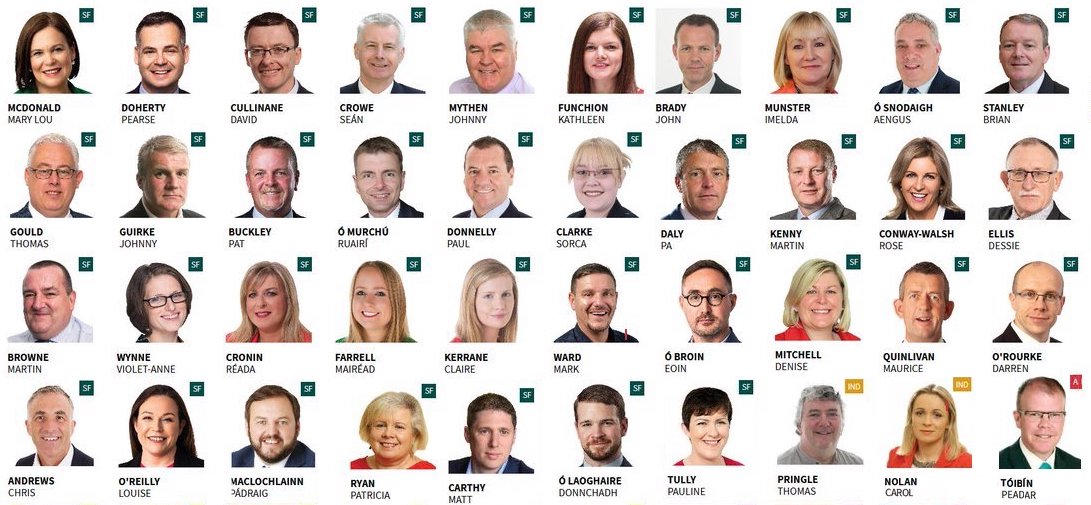
Republicans have been celebrating a history-making election which saw forty TDs from the tradition sign into Leinster House this week, erasing the concept of the two-party state in the process.
Sinn Féin activists released a map which showed how much the party has gained, with the areas coloured green where it topped the poll in both parts of Ireland in the Leinster House election and the Westminster election in December. The map bears a resemblance to the historic 1918 election, in which the then Sinn Féin movement won a national landslide and which set the scene for the First Dail and the armed struggle for Irish independence.
Sinn Féin has 37 TDs in this parliament, up 15 from four years ago. It has the largest number of female TDs elected at 13, while the average age for the party’s new TDs is just 44.
Although the mainstream media has become engrossed by the idea of a party once associated with the Provisional IRA entering government, Sinn Féin’s new TDs have been focused on delivering on the party’s policy.
A new TD in Kerry, Pa Daly, said he was looking forward to getting to know everyone and getting started. “I think the people are looking to the future and what’s relevant to them are the policies in relation to housing, health, pensions, issues that matter nowadays,” he said.
Ruairí Ó Murchú, the newly elected Sinn Féin TD for Louth, was 16 years old when the Provisional IRA declared its first ceasefire in 1994. The conflict in the North was not an issue on the doorsteps during the election campaign, he said, while the housing and healthcare crises did. He said younger voters had backed the party in search of a change from the old Fine Gael-Fianna Fáil political monopoly.
“They are focused on the solutions we are offering to the problems that they are living with day in, day out,” he said. Sinn Féin voters had recognised that the party’s leadership “played a huge role in delivering the peace process”.
Mairéad Farrell, elected in Galway West in a first for the modern Sinn Féin party, said her first day as a TD had been a “very exciting day for all of us”.
“It’s about hitting the ground running for myself and doing the best I can for the constituency, so I’m looking forward to the days and weeks ahead.”
She added: “What was very interesting at the doors is that there were people who were lifelong Fianna Fáil and Fine Gael voters and they said, things aren’t going well for the ordinary person in the State.
“They said they would lend us their vote and that’s what it is – a lent vote to show those people that we will put them front and centre.”
There are hopes that this new cohort of TDs can harness the new support for republicanism to drive forward a long-promised agenda of equality, freedom and Irish unity.
Mary Lou McDonald rallied her parliamentary party with a call of “my friends, we have work to do”.
In her opening remarks to the first meeting of her TDs at Buswell’s Hotel, next to Leinster House, Ms McDonald reiterated her stance that the electorate has called for change.
She said that “before Saturday’s election I said this election could shape life in Ireland for the next decade and could be seismic for the Irish political landscape”.
“Well my friends, lo and behold, I think that assessment proved to be correct.
She said that her party’s mandate involves invoking solutions.
“Our objective is a government that builds homes, cuts rents and freezes them. We want to reduce the pension age to 65, and to stand up to the vulture funds and the insurance industry.”
She also said that advancing on Irish unity “is not just possible, but necessary at this time”.
She said it is the duty of the Dublin government to plan for the process leading up to a referendum on a united Ireland, but said that unionists “need not fear the debate and discussion about the future, because this needs to be an inclusive, engaging, and forward-looking debate”.
Elsewhere, former Sinn Féin TD turned independent Carol Nolan was reelected in Laois-Offaly. She said her success showed that people are “sick and tired of delays and inaction” on housing, health, education and issues that are important to the agricultural community.
Thomas Pringle, a republican independent was re-elected in Donegal -- one of three republicans elected in the constituency. He said it was incumbent on any new administration to reform policies on housing, health and rural Ireland. “We need to get away from the market-driven response to these issues, which is what Fine Gael and Fianna Fáil did for years,” he said.
There was also a success for Peadar Tóibín, the leader of Aontú who was re-elected in Meath West. He said he was satisfied with the result of his party amid a Sinn Féin surge and renewed his call for the new parliament to include MPs elected to Westminster.
![[Irish Republican News]](https://republican-news.org/graphics/title_gifs/rn.gif)
![[Irish Republican News]](https://republican-news.org/graphics/title_gifs/harp.gif)

